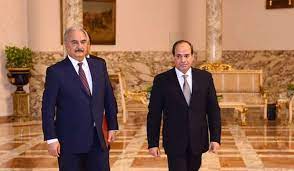The diplomatic crisis between Libya and Egypt has come to a head with the expulsion of two Egyptian diplomats accused of espionage.
This has exacerbated tensions between the rival administrations in eastern and western Libya, as well as the security and political challenges besetting the country.
Libya is plunged into a new diplomatic crisis with Egypt following the expulsion of two Egyptian diplomats accused of intelligence activities detrimental to the interests of the Libyan state.
The Government of National Unity (GNU) in Tripoli, led by Prime Minister Abdulhamid Dabaiba, ordered the expulsion of Egyptian Embassy Counsellor Adel Mohamed Hosni and Second Secretary Mohamed Mamdouh Mustafa al Sherbiny, giving them 72 hours to leave the country.
The decision follows an official visit to Cairo by the head of Libya’s Benghazi-based Government of National Stability (GSN), Osama Hamad.
During the visit, Hamad met with Egyptian Prime Minister Mustafa Madbouly as well as Belgassem Haftar, director of the Reconstruction Fund and son of General Khalifa Haftar.
This meeting provoked strong protests from the GNU, as Hammad’s government is not internationally recognised.
In response to the expulsion of its diplomats, the government of eastern Libya called on all foreign countries to move their embassies and international diplomatic institutions from Tripoli to Benghazi, citing the precarious security conditions in the capital.
The request comes after violent clashes between armed groups in the Tajoura district, east of Tripoli, left nine people dead and sixteen wounded.
In a statement, Hammad’s government expressed surprise at the GNU’s actions following its visit to Egypt.
“We appreciate the role of the Egyptian authorities and their supportive presence in strengthening relations between our two countries by meeting and discussing a number of common issues,” the statement said.
Jalel Harchaoui, a Libya expert at the Royal United Services Institute, pointed out on X that this diplomatic crisis comes at a time when Egypt is playing an increased role in regional crises, particularly in Gaza and Sudan.
“By taking such an ill-timed decision against Cairo, Dabaiba has chosen to escalate tensions instead of keeping a low profile, as he did when Ankara welcomed Belqacem Haftar as a member of the royal household two weeks ago,” Harchaoui said.
According to him, this decision could prove to be a strategic mistake for the Tripoli government.
Hammad’s visit to Egypt comes at a time of growing international concern over the military mobilisation in southwest Libya.
The ground forces of the Libyan National Army (LNA), under the command of Saddam Haftar, another son of General Haftar, recently sent military reinforcements to the Fezzan region.
This mobilisation prompted the GNU to raise the alert status of its forces.
Fezzan, rich in natural resources but impoverished by poor services and known as a crossroads for illicit trafficking, has become a major point of tension.
The international community fears that this military mobilisation will further aggravate the already precarious situation in the region.
MN/te/sf/lb/as/APA


